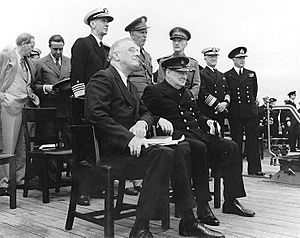Dudley Pound facts for kids
Quick facts for kids
Sir Dudley Pound
|
|
|---|---|
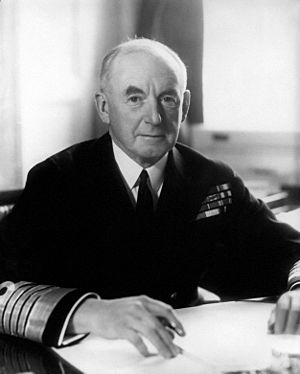
Admiral of the Fleet Sir Dudley Pound
|
|
| Birth name | Alfred Dudley Pickman Rogers Pound |
| Born | 29 August 1877 Ventnor, England |
| Died | 21 October 1943 (aged 66) Royal Masonic Hospital, London, England |
| Allegiance | United Kingdom |
| Service/ |
Royal Navy |
| Years of service | 1891–1943 |
| Rank | Admiral of the Fleet |
| Commands held | First Sea Lord Mediterranean Fleet Battle Cruiser Squadron HMS Repulse HMS Colossus |
| Battles/wars | First World War Arab revolt in Palestine Second World War |
| Awards | Knight Grand Cross of the Order of the Bath Member of the Order of Merit Knight Grand Cross of the Royal Victorian Order Mentioned in Despatches Officer of the Legion of Honour (France) Grand Cross of the Order of Polonia Restituta (Poland) Grand Cross of the Royal Norwegian Order of St Olav Navy Distinguished Service Medal (United States) |
Sir Alfred Dudley Pickman Rogers Pound (born August 29, 1877 – died October 21, 1943) was a very important officer in the Royal Navy. He served during the First World War as a commander of a large warship. He did very well in the Battle of Jutland, helping to sink a German ship called the Wiesbaden.
Later, he became the First Sea Lord. This was the top professional leader of the Royal Navy. He held this job for the first four years of the Second World War. One of his biggest successes was fighting against German U-boats (submarines). He helped win the Battle of the Atlantic. However, some of his decisions were questioned. These included the failed Norwegian Campaign in 1940 and the loss of two British warships, Prince of Wales and Repulse, in 1941. Also, in 1942, his order to scatter Convoy PQ 17 led to many ships being destroyed. His health got worse in 1943, and he stepped down from his role. He passed away soon after.
Contents
Early Life of Dudley Pound
Dudley Pound was born on August 29, 1877. His father, Alfred John Pound, was a lawyer. His mother, Elizabeth Pickman Rogers, was from Boston, USA. Dudley went to school at Fonthill School in East Grinstead, England.
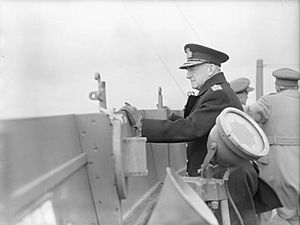
Dudley Pound started his naval journey in January 1891. He joined the Royal Navy as a cadet on the training ship HMS Britannia. A cadet is a young person training to become an officer. In January 1893, he became a midshipman on the battleship HMS Royal Sovereign. A midshipman is a junior officer.
He served on several ships around the world. These included the cruiser HMS Undaunted and HMS Calypso. He was promoted to sub-lieutenant in 1896 and then to lieutenant in 1898. He became a specialist in torpedoes in 1901. Torpedoes are underwater weapons.
Pound continued to rise through the ranks. He became a commander in 1909. He served on the battleship HMS Superb. In 1913, he joined the staff of the Royal Naval War College. This is where naval officers learn about war strategies.
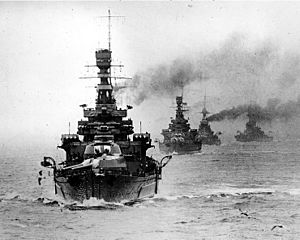
During the First World War, Pound was promoted to captain in 1914. He took command of the battleship HMS Colossus in May 1915. He led his ship with great skill during the Battle of Jutland. This was a huge naval battle. His actions helped sink the German cruiser Wiesbaden. After the battle, he worked at the Admiralty. He helped plan important naval operations, like the Zeebrugge Raid.
Death of Dudley Pound
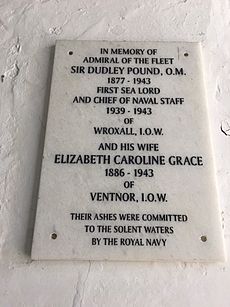
Dudley Pound passed away on October 21, 1943. This date is also known as Trafalgar Day. He died from a tumor at the Royal Masonic Hospital in London. After a funeral service, his ashes were scattered at sea in The Solent.
Dudley Pound's Family Life
In 1908, Dudley Pound married Betty Whitehead. They had two sons and one daughter named Barbara.
See also
 In Spanish: Dudley Pound para niños
In Spanish: Dudley Pound para niños
 | William L. Dawson |
 | W. E. B. Du Bois |
 | Harry Belafonte |


